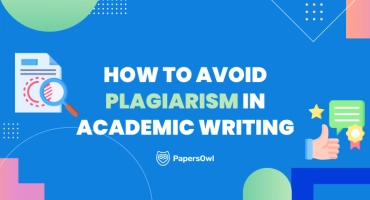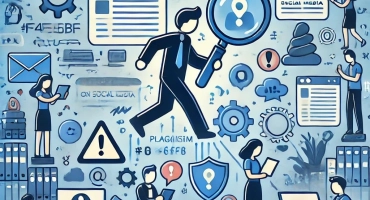The Most Interesting Facts about Plagiarism
The purpose of this helpful guide is to explore all peculiarities of plagiarism to help you detect and avoid it easier.
The purpose of this helpful guide is to explore all peculiarities of plagiarism to help you detect and avoid it easier. Academic integrity and plagiarism have always been sensitive issues not only among scholars but also in the media, especially now that advanced tools like the originality checker can quickly identify copied content. Be it the world of social media and original blog posts or a plethora of college papers checked by trained professors, plagiarism raises serious concerns.
According to an old study by Rutgers University done in 1991 when the Internet and websites have not been in common use, approximately 66% of 16,000 learners belonging to the world’s top universities have cheated at least once. The problem is that facts of plagiarism back then were not that easy to detect since only a skilled professor or editor could spot similarities in style or identify entire copied paragraphs. These days, when we have AI-based detection tools, it became possible to check anything from old court hearings to governmental papers to detect new facts about plagiarism.
Turning to plagiarism facts, remember to approach these with a grain of salt since we may not know all the preceding elements or a list of reasons why something has not been credited. While mistakes in annotated bibliography could be explained by the lack of proper cognitive functions and responsibility, cases, when something has been hidden or stolen intentionally, represent another matter.
9 Interesting Facts About Plagiarism
- More than 60% of university students admit to academic dishonesty.According to ICAI (International Center for Academic Integrity), checking over 840 students by the McCabe survey has revealed that at least 32% of undergraduate students have cheated during an exam. However, only 2% of college students have asked another person to complete their work while submitting it as something they have done without extra help.What makes this research even more interesting is that students have found another way to avoid plagiarism. A new emerging type of plagiarism includes working on some assignment along with other students when it has been asked to provide individual (single person) paper. According to the same research, 28% of undergraduate learners fall into this category. Another fact shows that paraphrasing without citing in a paper is not so frequent with only 15% of undergraduates.
- Old plagiarism cases are constantly being discovered.One of the most interesting facts about plagiarism that has been discovered recently relates to fraud cases of war photographs supposedly taken in Iraq and Syria that showed children in Gaza and devastated families in Syrian suburbs. The famous name of Eduardo Martins became almost a household name as the Brazilian hero has been risking his life to deliver these images. The BBC investigation has shown that many photographs have been plagiarized and were taken by famous photographs like Daniel C. Britt. The real name of a person who has made it in the news still remains unknown.
- Plagiarism facts are not only about text content.One of the most famous cases dealing with non-text content is a plethora of specific, almost bizarre art created by Andy Warhol who was the leading figure of the pop art movement. The most famous plagiarism case that has been in the media for decades is the lawsuit that has been issued by the Velvet Underground who could not keep silent over the famous banana image. It shows that even if you take some pictures that you discover online, something that has been “basically everywhere”, it is always crucial to seek an original author. If you are not sure about who an original creator is, citing an odd source is insufficient because it can easily get you involved in intellectual property disputes.
- Internet plagiarism cases must be studied separately.According to the national survey that has been published in the Education Week, over 54% of college students blamed the Internet for their plagiarism problems since they could not find detailed authorship information. What makes it even more alarming is that over 74% of students stated that they have cheated at least once during their school year, which has been “quite serious”.As the study shows, over 47% of students believe that their teachers often choose to ignore cheaters as long as provided information is structured and contains no mistakes. It makes it important to focus on Internet sources and check for plagiarism even deeper when the use of digital sources that represent multimedia pictures, web pages, and resources are present.
- Plagiarism tools help detect government waste cases.An even more serious fraud relates to a famous Puerto Rican hot meal contract as has been discovered by Democratic Senators Claire McCaskill of Missouri, Heidi Heitkamp of North Dakota, and Gary Peters of Michigan. According to them, Tribune Contracting LLC has lost its contract in October, which has been only after just twenty days as only 50,000 hot meals have been delivered out of the 30 million meals promised. The problem is that the company in question has plagiarized the bid part for the Puerto Rico contract. While it shows an apparent systematic weakness in FEMA’s contracting process, it is a clear case of not only federal but also international plagiarism fact.
- Plagiarism facts are most common in political campaigns.Contrary to a popular belief, the majority of famous plagiarism facts are encountered not among college students but in the field of politics and foreign relations. Among the famous plagiarism facts, we can mention a speech that has been made by Melania Tramp in 2016. Melania has been accused of plagiarizing her speech from the one that has been originally penned by Michelle Obama and her team. Even though both speeches have mentioned the same values and the role of parents who did their best to instill certain principles during one’s childhood, it was the wording and style that have been identical. It has forced English-speaking people to analyze both speeches in greater depth. Still, such plagiarism facts are not always intentional as it is easy to get inspired and copy from each other, yet when a speech is written by professionals, it can become a serious issue and the legal ground for lengthy court disputes.
- Societal effects of plagiarism.While some may say that plagiarism is always isolated from case to case, it also has a strong societal impact as we live in the age of social media, globalization, and a plethora of online content that is often copied without a second thought. Although networks like Facebook and Instagram have endless wars based on who created this or that first, higher education’s corporate image is always a reflection of our society.Plagiarism prevention must be approached as a separate culture that is instilled as a moral standard. Let us remember that academic integrity and plagiarism avoidance are based upon five pillars that are honesty, trust, fairness, respect, and responsibility. As more research is being conducted, plagiarism is studied as a social phenomenon that affects more than just a document or scientific research. It is a matter of being true to yourself and others.
- Plagiarism detection tools will never replace human analysis.It may sound obvious when we discuss facts about plagiarism, yet many students believe that a system can detect it all or that there are cheating cases when something is always ignored. Essentially, it takes a trained academic specialist who can see whether a person has copied original text or paraphrased it without giving due credit. When you copy an entire paragraph from your textbook, it is serious plagiarism, yet when you fail to enter a correct reference for medical research, it is way more significant and something that almost no AI-based tool can catch.
The Ethical Aspect of Plagiarism
Discussing facts about plagiarism, one should analyze each particular case in greater depth because intentional theft and accidental mistake are not the same. Without a doubt, as we can see from the history of plagiarism, it has always been around in this or that form because it deals with the ethics and honesty of a person who either creates original information or intends to share it. If one approaches it through the prism of psychology or even philosophy, it becomes clear that intentional cases of plagiarism are just theft cases. It is totally different when we are dealing with unintentional plagiarism facts like those that may be encountered during emotional speeches or political campaigns.
When an individual accidentally quotes something that has been heard or read somewhere, it is rarely checked as it feels correct in the general context. Still, it violates moral and ethical aspects because political rights and authority do not make it any less important. Therefore, when we analyze plagiarism facts by referencing examples of plagiarism from the past or deal with modern cases, it is essential to understand why exactly it has happened and what moral standards have been followed. It would be incorrect to talk about Martin Luther King Jr. and his plagiarism accusations without knowing all these background factors that have helped scholars at Boston University to rule their final decision in favor of the great man. Analyzing plagiarism facts and accusations, they could see that Martin Luther King’s work has made an “intelligent contribution” that brought a new insight to the field of theology and structuring of philosophical readings. It makes it clear that every case must be studied rigorously to determine all the factors at play.







